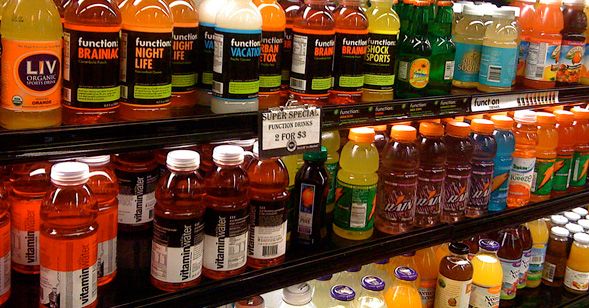What Is A Sports Drinks And When Should You Have One?
Many people assume that sports drinks are a 'health' drink or are necessary when participating in any kind of workout or sport; but this is not the case. In this article I hope to highlight the purpose of sports drinks and when it may be worthwhile having one.
What is a sports drink?
Sports drinks are specially formulated to help athletes rehydrate and delay the onset of fatigue during/after a race, or workout. They help replenish carbohydrates, which is the main fuel source for the body, and electrolytes which promote proper rehydration.
However not all sports drinks are the same - there are three types:
Isotonic drinks generally contain carbohydrates and electrolytes at a concentration similar to the body's own fluids (6-8%). This level of concentration quickly replaces fluids lost by sweating and provides a boost of carbohydrates. They are the most common type of sports drinks available and examples include Gatorade and Powerade.
Hypotonic drinks have a much lower concentration of carbohydrates and electolytes then isotonic drinks (generally 1-3%). This level of concentration will promote rapid fluid absorption to rehydrate the body, but provides less carbohydrates, so it won't give you much of an energy boost. Commercially available hypotonic drinks are not widely sold in Australia but examples include Mizone Rapid and Maxim Energy Drink. However the most common (and freely available) hypotonic drink is water itself!
Hypertonic drinks are at the other end of the scale and have a carbohydrate concentration higher than 8%. This level of concentration slows down the rate of fluid absorption into the body which means they are unsuitable to use during exercise. However, the high level of carbohydrates means that hypertonic drinks may be suitable for long distance athletes to top up muscle glycogen stores several hours before or after exercise. However hypertonic drinks should be taken with isotonic drinks or water to ensure proper hydration.
Like hypotonic drinks, sports branded hypertonic drinks are not widely available in Australia. However it should be noted that hypertonic drinks actually fall more into the category of ‘energy drink’ and examples include Red Bull and everyday soft drinks.
When should you have a sports drink?
Most sports drinks (isotonic drinks) can be helpful to people who are exercising at a high intensity for over 60 minutes to maintain bodyweight, health, and aid in continuous sports performance. However it really is not necessary to replace electrolytes such as potassium and sodium unless you are exercising in very tough conditions for over 3 hours (e.g. a marathon or ironman race).
When shouldn't you have a sports drink?
If you are exercising for less than 60 minutes there is little evidence to suggest having a sports drink will provide additional benefits to having water. There is also little evidence to suggest that sports drinks will help improve performance in weight training.
For most people and training situations, a nutritional balanced diet and adequate food and fluid intake, especially in the 24 hours prior to exercise, is what's needed to maintain exercise/sports performace. Staying well hydrated before, during and after exercise will also decrease your risk of dehydration which will impact on performance.
So if you are just hitting the gym for a spin class or a weights workout, you're better off saving your money and sticking to water to keep yourself hydrated.
And if you're stopping at a service station or out at a cafe and are feeling thirsty, don't kid yourself that a bottle of Gatorade is a healthy option. Having this will only provide you with additional and unwanted calories. You're better off requenching your thirst with water. So when you've got your hand in the fridge, remind yourself that a sports drink is not a health drink. Grab a sports drink if you like the taste of them, but remember they will provide you with calories you probably don't need.

